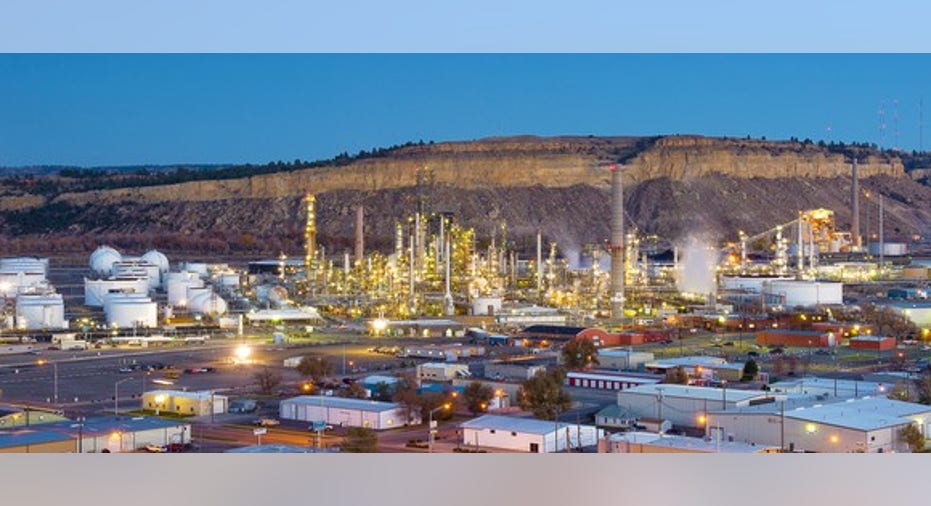Will Refinery Cuts Have Long-Term Impacts on Phillips 66?

IMAGE SOURCE: PHILLIPS 66.
Warren Buffett once again put Phillips 66 (NYSE: PSX) on every investor's radar in August, when he purchased 788,000 shares of the company's stock on top of the nearly 80 million shares he already owns. While no one would blame you for following the Oracle of Omaha's lead and buying into Phillips 66, the purchases come as the company cut production at its 238,000-barrels-per-day Linden, N.J., refinery by 5%. For a company that receives a majority of its revenue from refining, this seems worrisome. Fortunately, these cuts were expected, and Phillips 66 continues to reshape its business to ensure long-term growth. Here's how.
Refining
Following Phillips 66's second-quarter earnings release, CEO Greg Garland warned investors that low refining margins and an oversupply of inventory will likely lead to refinery throughput cuts. He expected Phillips 66 to trim its refinery runs from the 100% utilization of the second quarter to 95% in the second half of 2016. Based on that guidance, the 5% reduction at Linden shouldn't come as a surprise. Additionally, don't be surprised if Phillips makes similar throughput cuts in its other refineries during the remainder of 2016.
Purposeful cuts in its core business production are obviously alarming, but keep in mind that 95% utilization is still highly efficient. It's difficult to determine how this will affect the company's refining revenue stream, as that will be largely determined by the overall refining margin. It seems intuitive that lower production will adversely affect the bottom line, but if the cuts help push prices up amid the oversupply, it could help expand the margin.
And make no mistake: For a company that's highly dependent on refining revenue, the low refining margins have been severely damaging to its earnings. In the second quarter, that margin dropped 40% from a year ago to $7.13 per barrel, which knocked its adjusted refining earnings down 75% from $604 million to $152 million. A year ago, refining accounted for 60% of its adjusted earnings. Now it accounts for 30%.
Reshaping its portfolio
Fortunately, Phillips 66 leadership has taken note of this alarming trend and realized the company must strengthen its other business sectors. You don't need to look much further than its 2016 capital program. While it has set aside $1.4 billion for refining expenditures, primarily for sustaining purposes, it's planning to spend more than $2.5 billion on its midstream business and $1 billion on its chemical business, primarily on growth purposes.
These expenses include investments for its MLP, Phillips 66 Partners (NYSE: PSXP), which just recently acquired a natural gas logistics system in Louisiana from Chevron. Phillips has extended loans and dropped down several assets in recent quarters to the MLP to expand its logistics footprint. Additionally, Phillips remains a partner in the joint venture to develop the Dakota Access and Energy Transfer Crude Oil pipelines and continues to work on the expansion of its Beaumont Terminal to add 3.2 million barrels of new storage capacity.
Phillips is expecting these projects to come online and contribute to its cash flow within the next two years. These moves are consistent with its strategic plan to reshape its portfolio by pursuing growth opportunities in the midstream and chemicals markets, while making efficient capital investments to maximize earnings and maintain financial strength.
Foolish bottom line
Warren Buffett is traditionally a long-term investor and is probably willing to overlook the 5% production cuts in lieu of the strategic direction of the company. You can look at the $1.2 billion in cash flow from operations last quarter and the $571 million in shareholder returns through dividend and share buybacks as evidence of a strong performer in a difficult environment. Refining will remain a core aspect of Phillips 66's business, so impacts of low refining margins for a prolonged period of time is something to monitor. The investments to strengthen and reshape its portfolio, though, should help ensure that the company continues to deliver long-term returns.
A secret billion-dollar stock opportunity The world's biggest tech company forgot to show you something, but a few Wall Street analysts and the Fool didn't miss a beat: There's a small company that's powering their brand-new gadgets and the coming revolution in technology. And we think its stock price has nearly unlimited room to run for early in-the-know investors! To be one of them, just click here.
David Lettis owns shares of Chevron and Phillips 66. The Motley Fool recommends Chevron. Try any of our Foolish newsletter services free for 30 days. We Fools may not all hold the same opinions, but we all believe that considering a diverse range of insights makes us better investors. The Motley Fool has a disclosure policy.



















